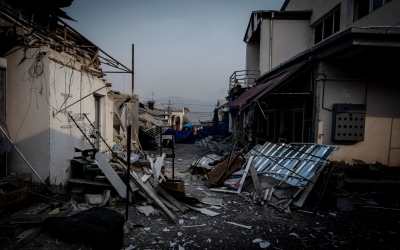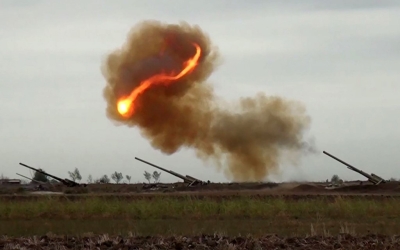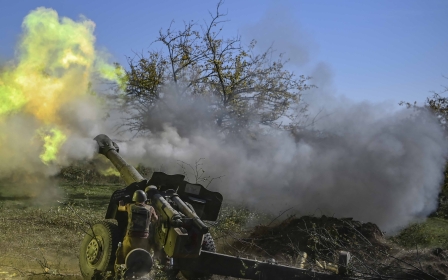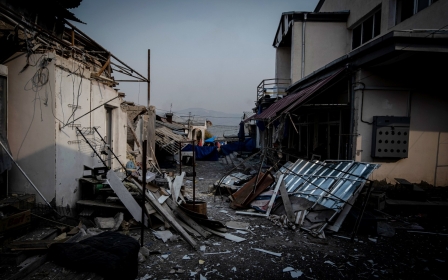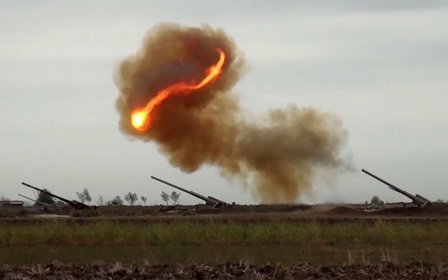Armenia, Azerbaijan and Russia sign Nagorno-Karabakh peace deal
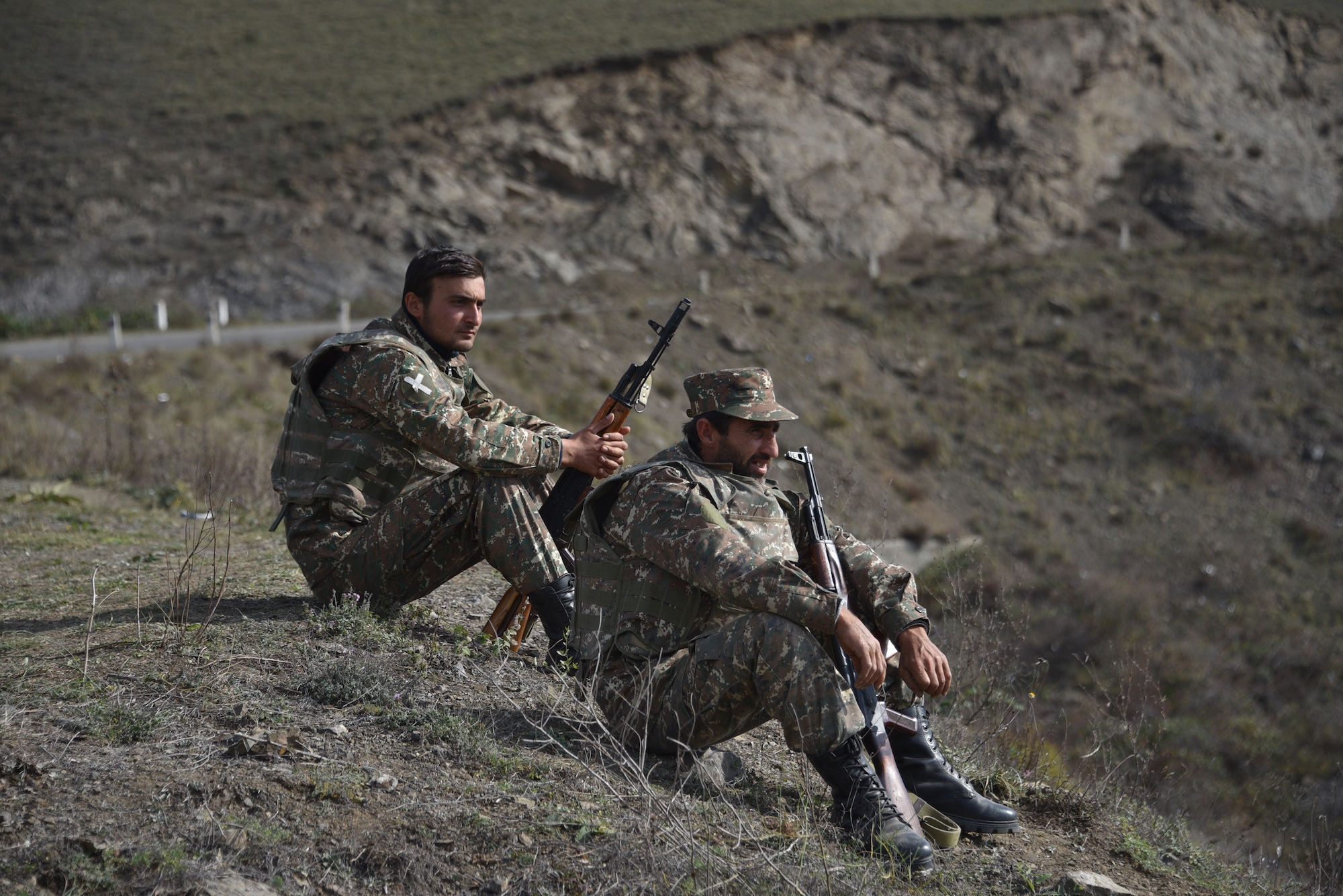
Armenia, Azerbaijan and Russia say they have signed a deal to end the military conflict over the Nagorno-Karabakh region after more than a month of bloodshed.
Armenian Prime Minister Nikol Pashinyan first announced the signing on social media in the early hours of Tuesday and the Kremlin and Azerbaijan's president Ilham Aliyev later confirmed the news.
"The signed trilateral statement will become a [crucial] point in the settlement of the conflict," Aliyev said in a televised online meeting with Russian President Vladimir Putin.
Putin said Russian peacekeepers would be deployed along the frontline in Nagorno-Karabakh and the corridor between the region and Armenia, Reuters reported.
In an exclusive report on Sunday, Middle East Eye reported that a peace deal was imminent.
Arayik Harutyunyan, the leader of the Nagorno-Karabakh region, said on Facebook that he gave agreement "to end the war as soon as possible".
The declaration has followed six weeks of heavy fighting and advancement by Azerbaijan's forces.
Pashinyan said on Tuesday he made the decision to sign the ceasefire after the army insisted on it.
Protesters stormed government buildings in Yerevan, as anger over the deal mounted.
Angry Armenians gathered outside Pashinyan’s official residence in the Armenian capital, Government House No 1.
Protesters ripped Pashinyan's nameplate off his office door, chanting: “Nikol has betrayed us.” The prime minister’s location was unclear.
Crowds also forced their way into parliament where the speaker, Ararat Mirzoyan, was beaten unconscious by an angry mob.
Turkish support
Nagorno-Karabakh broke away from Azerbaijan in the 1990s, prompting a long unresolved conflict that has seen tens of thousands of people killed.
The disputed mountainous area has been held by Armenian forces for nearly three decades, despite four UN Security Council resolutions urging them to withdraw.
The recent fighting had raised fears of a wider regional war, with Turkey supporting Azerbaijan, with which Ankara has close ethnic Turkic ties, while Russia has a defence pact with Armenia and a military base there.
The game changer in the frozen conflict appears to have been Turkey's direct military aid to Azerbaijan since the summer.
"The brotherly Azerbaijan has achieved an important gain on the battleground and table. I sincerely congratulate this sacred success," Turkish Foreign Minister Mevlut Cavusoglu said on Twitter following the announcement of the peace deal.
"We will continue to be one nation, one spirit with our Azeri brothers."
Cavusoglu and his Russian counterpart Sergei Lavrov discussed the ceasefire deal by phone on Tuesday, Russia's foreign ministry spokeswoman told the Echo Moskvy radio station.
Turkey and Azerbaijan have conducted joint military drills for years, most recently in August, when Turkish officers shared the experience and expertise they had developed in the Syrian and Libyan conflicts.
Ankara has brought in Syrian mercenaries to prop up Azerbaijani defences, while deploying Turkish military staff to create a strategy for Baku.
Turkey has also sold armed drones which have devastated the Armenian front and deployed Turkish F-16s as a deterrent, even though they were not used in the actual fighting.
Baku said on Monday it had seized dozens more settlements in Nagorno-Karabakh, a day after proclaiming victory in the battle for Shusha, the enclave's strategically positioned second-largest city.
"The decision is made basing on the deep analyses of the combat situation and in discussion with best experts of the field," Pashinyan said.
"This is not a victory but there is not defeat until you consider yourself defeated. We will never consider ourselves defeated and this shall become a new start of an era of our national unity and rebirth."
Thousands feared dead
Azerbaijan says it has since 27 September retaken much of the land in and around Nagorno-Karabakh that it lost in a 1991-94 war which killed an estimated 30,000 people and forced many more from their homes.
Armenia has denied the extent of Azerbaijan's territorial gains.
Several thousand people are feared killed in the flare-up of the conflict. Three ceasefires have failed in the past six weeks and Azerbaijan's superior weaponry and battlefield gains have reduced its incentive to seek a lasting peace deal.
Azerbaijan said on Sunday it had captured Shusha, known by Armenians as Shushi, which sits on a mountaintop overlooking Stepanakert, the city regarded as the enclave's capital by its ethnic Armenian administration.
Aliyev announced a list of 48 settlements he declared liberated on Monday in several parts of the enclave.
An Azeri defence ministry video posted online showed Azerbaijan's national flag flying over deserted streets in what it said was Shusha.
Armenia disputed that the city had fallen.
Middle East Eye delivers independent and unrivalled coverage and analysis of the Middle East, North Africa and beyond. To learn more about republishing this content and the associated fees, please fill out this form. More about MEE can be found here.


